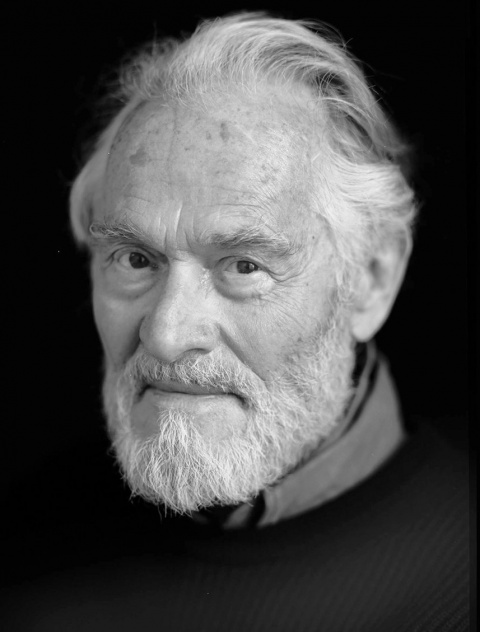Columbia College | Columbia University in the City of New York
Herbert Gold ’46, GSAS’49, Critically Acclaimed Author Who Found Fame To Be Fleeting
Gold published nearly 40 novels in his career, many of which were released to critical acclaim. Yet he rarely received the public attention that went to many of his colleagues, a cohort that included Saul Bellow, William S. Burroughs, Allen Ginsberg ’48, Jack Kerouac ’44, Norman Mailer, Vladimir Nabokov, George Plimpton and Philip Roth.
“Herbert Gold always seems on the verge of writing the big one,” Newsweek wrote in 1967, shortly after Gold published the autobiographical novel Fathers: A Novel in Form of a Memoir, about a Russian Jewish immigrant grocer and his son, who turns away from his father. Fathers was a bestseller and Gold’s image graced the covers of TIME, Newsweek, The New York Times Book Review and Saturday Review.
That turned out to be his fleeting fling with fame, as he described in a 1974 interview with Transatlantic Review. “I took a plane to New York and was recognized by the stewardesses,” Gold said. “I was given great attention, I was recognized at the airport, I was an instant celebrity.” Two weeks later, he said, “It was all over. Several new issues of TIME had come out. Several issues of Newsweek had come and gone. There were new celebrities.”
Gold was born in Lakewood, Ohio, a suburb of Cleveland, on March 9, 1924. While Cleveland had a large Jewish population, Lakewood did not and that made its mark on Gold.
“I grew up in a terribly antisemitic community,” he told Jewish News of Northern California. “People wanted to see my horns or my cloven hoof. People would chase me home from school. People betrayed me.”
After high school Gold spent time in New York City and Key West, Fla., before he enrolled at the College, where after a break to serve three years in the Army he graduated with a B.A., and an M.A. in philosophy. In 1948 he studied at the Sorbonne in Paris on a Fulbright fellowship and worked on his first novel, about an accountant from Ohio who fancied himself a French resistant. After stops in Detroit and New York, Gold settled in 1960 in San Francisco, where he divided his time among fiction, journalism and teaching stints at several universities including UC Berkeley, Stanford, UC Davis, Harvard and Cornell. “But I didn’t want to depart San Francisco, my temporary residence for more than 55 years,” he said.
His early novels, The Birth of a Hero (1951) and the highly praised The Man Who Was Not With It (1956), showed a hipster sensibility in their treatment of heroes working toward self-realization. Although Gold distanced himself from the hipster label, he later analyzed the Beats and the 1960s counterculture in Bohemia: Where Art, Angst, Love, and Strong Coffee Meet (1993).
In later novels, like He/She (1980), True Love (1982), A Girl of Forty (1986) and She Took My Arm as If She Loved Me (1997), he returned to the emotional territory of his earlier fiction, but with an older man’s understanding of love and its pitfalls. He addressed the complexities of Jewish identity in the United States in Fathers and its sequel, Family (1981); in a novel-memoir that leaned toward autobiography, My Last Two Thousand Years (1972); and a memoir, Still Alive! A Temporary Condition (2008).
A collection of poems, Father Verses Sons: A Correspondence in Poems, in which a father and his two sons write tenderly of their hunger for connection and about the wife/mother whom they lost, was published posthumously in March 2024. Like all his work, it was composed on a manual typewriter, Gold preferring that sensibility to electric typewriters or computers.
“Writing for me seems to be an act of sculpture in which the pen is a brush, the typewriter a hammer, the scissors an awl, and the smells and stickiness and reflections of erasers, Scotch tape, paste and staples are all a part of the procedure,” he wrote in the San Francisco Chronicle. “I need to express disgust by ripping a sheet of paper — one more tree gone — out of the machine, balling it up, bouncing it against the wall.”
Gold’s two marriages ended in divorce. He is survived by a daughter, Ann Gold Buscho, from his first marriage, to Edith Zubrin; and by three children from his second marriage, to Melissa Dilworth, Ari, Ethan and Nina. He also is survived by two brothers, Robert and Eugene; six grandchildren; and four great-grandchildren. He was predeceased by another daughter from his first marriage, Judith; and a brother, Sid.
— Alex Sachare ’71
Issue Contents
Published three times a year by Columbia College for alumni, students, faculty, parents and friends.
Columbia Alumni Center
622 W. 113th St., MC 4530, 6th Fl.
New York, NY 10025
212-851-7852
cct@columbia.edu
Columbia Alumni Center
622 W. 113th St., MC 4530, 4th Fl.
New York, NY 10025
212-851-7488
ccalumni@columbia.edu


